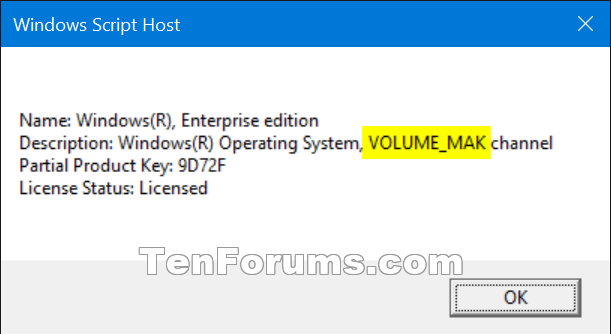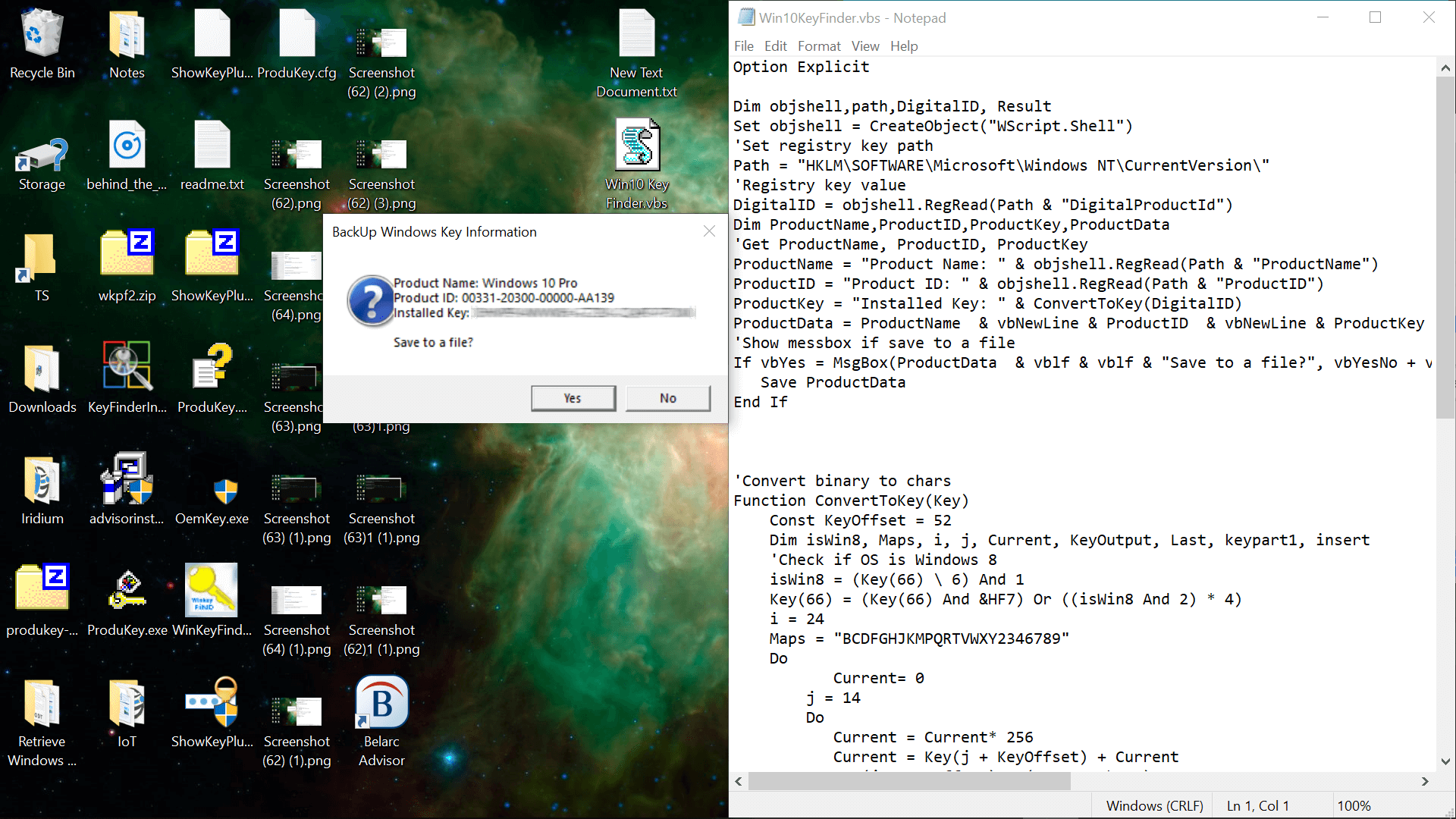Check If Windows Key Is Valid
How to determine if a Windows 7 key code is valid or not? I'm trying to repair a laptop that has a Genuine Windows 7 key code sticker on the underside of the laptop. It is a 5 to 7 year old laptop.
I'm trying to repair a laptop that has a Genuine Windows 7 key code sticker on the underside of the laptop. It is a 5 to 7 year old laptop that has seen much wear.All but one of the letters on the Key Code sticker are readable. We need to reinstall Windows 7 on a new hard drive as the old one has failed. So we need a way to determine the missing letter. It looks like it could be one of three possible ones.Is there a way to test the key code with each the three alternatives for the unreadable letter to determine which one is valid.We can't simply read the original key code from the Windows operating system because the hard drive has failed.
It won't boot up and it won't past the Windows Recovery hard drive diagnostic test.Going to Microsoft's web site to download Windows 7 installation media doesn't work either. Looks like official access to Windows 7 from Microsoft may have been disabled in anticipation of the release of Windows 10. Perhaps, anyway. Before you wipe the system you could use a product like magic jelly bean to recover the code however most of those codes are OEM, and applied to multiple machines.
If you are using a retail Windows 7 install the product key on the underside of the machine won't work. OEM and Retail have separate keys and are not interchangeable.
If you use the media that came with the laptop to reinstall it won't be an issue. I have reinstalled on my Moms laptop multiple times with the media created when she got the laptop. How to install mods for the sims 3. Said by norwegianWhat O/S and browser are you utilizing?Do you have filters in your browser?Can you not check from your own computer that is updated?I've tried it in Firefox and with IE 11 from my own Windows 7 computer.It is updated as of up to about a week ago when it appeared that Microsoft quit updating W7.My Firefox has AdBlock Plus on it.
IE 11 is pretty much wide open.Perhaps it worked from your computer because you were checking the same key code that is in use on your computer? What happens if you try another 'known-good' Windows 7 key from your computer? Said by:Is there a way to test the key code with each the three alternatives for the unreadable letter to determine which one is valid.Just start installing your OS. When it comes to the activation part, enter the first key you think it is, and it simply complain if the key isn't valid.
The keys are generated in such a way that you will never have two keys with just one character difference, otherwise people would be able to activate keys with accidental typos or deliberately trying to activate a 2nd computer by changing one character. So you don't have to worry about accidentally activating someone elses key, because it won't happen.The keys have probably at least 5, possibly 10 different characters between EACH key, so it becomes pretty much impossible to 'guess another key' from one you have.So just keep typing keys till it accepts. Said by:Perhaps it worked from your computer because you were checking the same key code that is in use on your computer? What happens if you try another 'known-good' Windows 7 key from your computer?I am running Win 8.1 and tried with my Win 7 key, it had no problems with the validating process.If you have no filters in place (ThreatMatrix is listed in Ghostery's database of filters) then I would look at your certificate database or something of that nature if you do not have it pass or fail the keys you try.Still as others have pointed out, just trying keys is fine and you have 30 days to guess. Without being there, it is suggesting it is a valid key then.What it is saying is the tool cannot help you because it does not support OEM, such as HP.»Microsoft have never really supported OEM, hence why install media creators and/or recovery partitions came about.OEM didn't want to supply support outside of the laptop without returning it. Gem:1) If you do not have OEM discs, you can likely order them from HP for a shipping/handling fee. Usually it's no more than around $25-30 bucks.

Usually you will get multiple disks, which will restore the laptop with all the junk software that comes with it.2) There is a 'standard' OEM disc (for clone builders) that will work on any laptop, Dell, HP, or otherwise. If you don't feel like spending the money in option 1, find someone that has a disc and just make a copy of that disc. The key on your computer should work with it.

The advantage of taking option 1) over option 2) is that the manufacturer-specific DVD has all the correct drivers with it (sometimes on a separate disc). Usually this isn't a big problem however, as long as you have the NIC drivers (which you can put on a USB stick) you can download the rest.3) When installing Windows, you can guess the missing character, and just keep trying until you get it right. Windows is not going to 'lock you out' of trying. You have quite a while (30 days, but it can be extended with a documented procedure (on Microsoft's website) twice to a total of 90 days if you need more time) to figure out the right key once you have Windows installed. If it is only one character, you can try 36 times (26 letters + 10 numbers) and one of em should work. (Note that it's less than that, Microsoft's keys do not use certain characters such as 0 and O and 1 and I, etc.).
Thanks for the offer ZTLonewolf.I have a W7 OEM disc that I use on my own HP laptop. Tried using that to reinstall W7 on the friend's HP lappie with the intent to use various iterations of the friend's W7 keycode, but the installation hung up before it finished.Looks now like the friend's hard drive is defective enough that no OS will install on it. So this project will have to wait now until we see if the user wants to buy a new hard drive or simply get a new or used working laptop from HP or elsewhere. Said by:Maartena, please tell us more about the 'standard' OEM disc that will install on any manufacturer's computer.Is that the same as an OEM OS disc from Newegg?Yep. Any system builder (such as a local store selling PC's) can get those OEM's from places like NewEgg and sell them as part of the PC. They should install on ANY system that has a OEM key on it.You don't have to be a system builder to get one either. Technically speaking, they are meant for building new systems and if you buy your own hardware, that is the OS type to get.
But Microsoft isn't going to cry if you buy one to replace a disc you no longer have. Said by:Looks now like the friend's hard drive is defective enough that no OS will install on it. So this project will have to wait now until we see if the user wants to buy a new hard drive or simply get a new or used working laptop from HP or elsewhere.With another computer, download the drive manufacturers software. Seagate Seatools, Western Digital's Data Lifeguard Tools come to mind. Let the tool check the drive for errors. If you're not worried about the data, and the drive checks out, go ahead and reformat the drive.Install Windows. Once you install it, call Microsoft and explain what you are trying to do.
They should be able to activate the OS using your OEM key. Neonhomer said:'With another computer, download the drive manufacturers software. Seagate Seatools, Western Digital's Data Lifeguard Tools come to mind. Let the tool check the drive for errors. If you're not worried about the data, and the drive checks out, go ahead and reformat the drive.' Did all that with Seagate's tool.
Wiped the drive. Tried to reinstall Windows 7, but it hung up before getting to a window that would ask for the key.Prior to doing that, checked the drive with HP's diagnostics test. It failed all four times I ran the test. It was after that that I used the Seagate tool to wipe and reformat the drive. While doing that, an error message came up saying it couldn't read or write to certain sectors.
Guess that's why Windows wouldn't install. Had to try it anyway.I thought Windows would run checkdisk prior to installing Windows and that it would attempt to repair errors or mark bad sectors as bad and not to be used during the installation process.Did Windows ever do that?If so, does it still do that during installation of the OS? Thanks for the link, Freddy. I will try that if we run into trouble after getting a new hard drive if that is what the friends want to do.I won't see them again until next week, but will post a follow up if they decide to get a new drive and continue to have me work on this one.Then again, they may just want to buy a new or used HP laptop on the Internet. The last time I did that we got a nice Windows 7 three years old HP laptop with an Intel i3, 500GB hard drive, and 4GB of ram for under $200. That's less than a drive and OS would cost.

Windows Online Check If Product Key Is Valid
Up to them to decide.